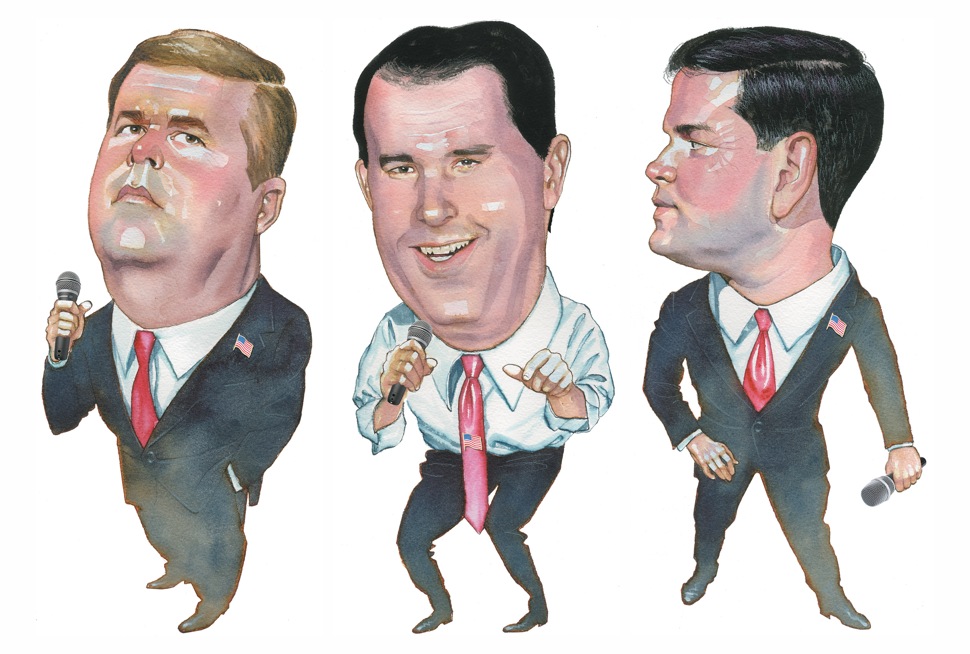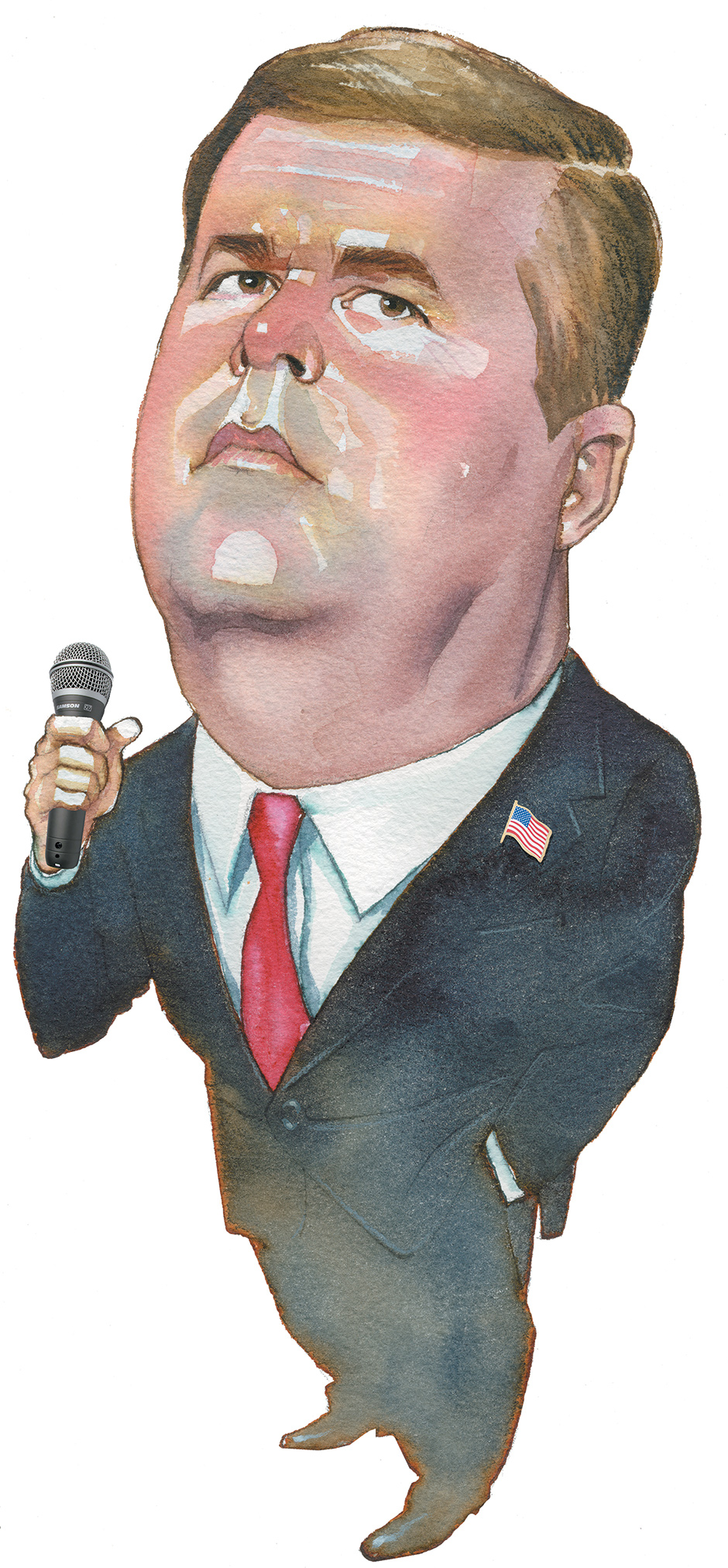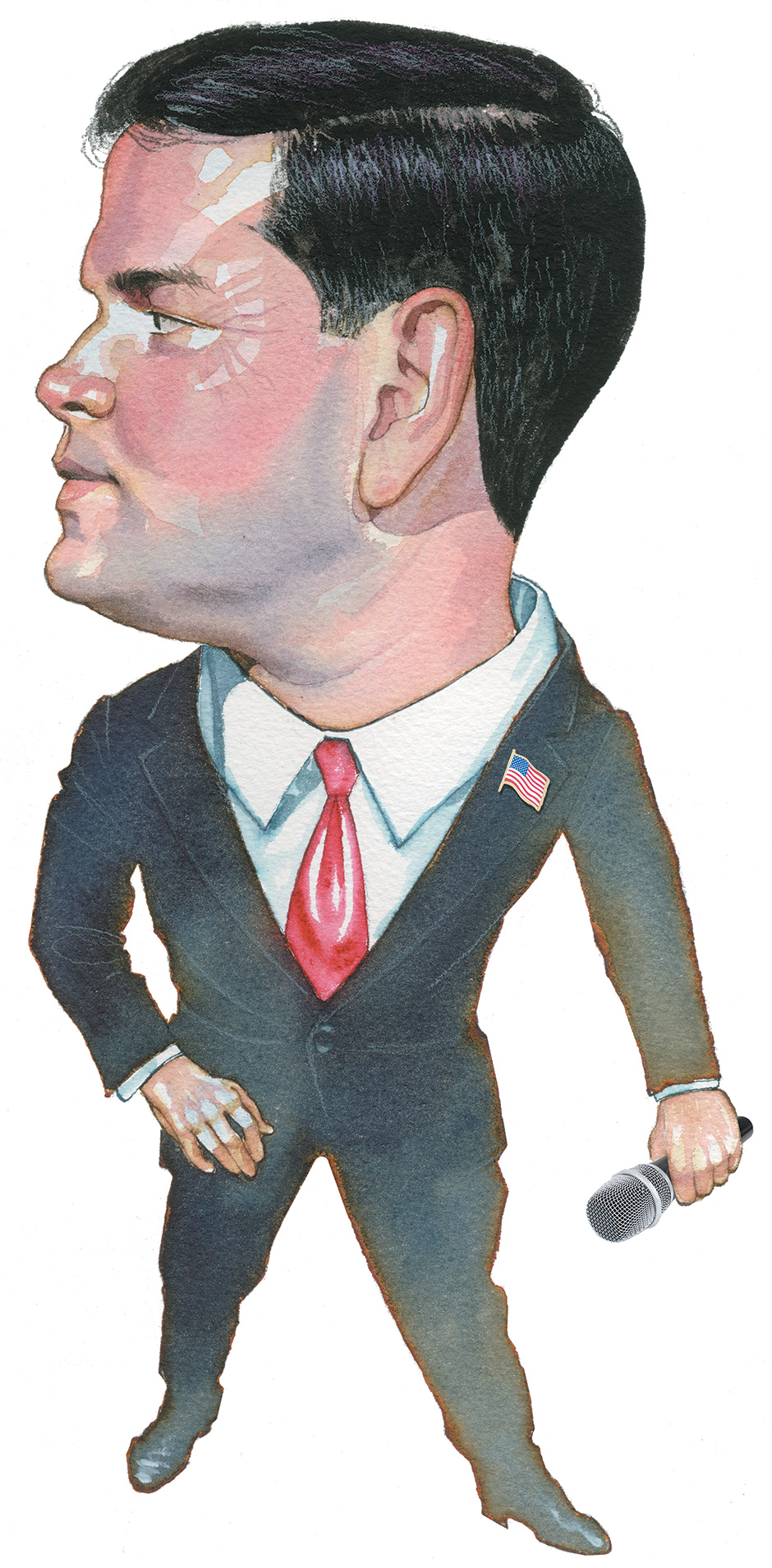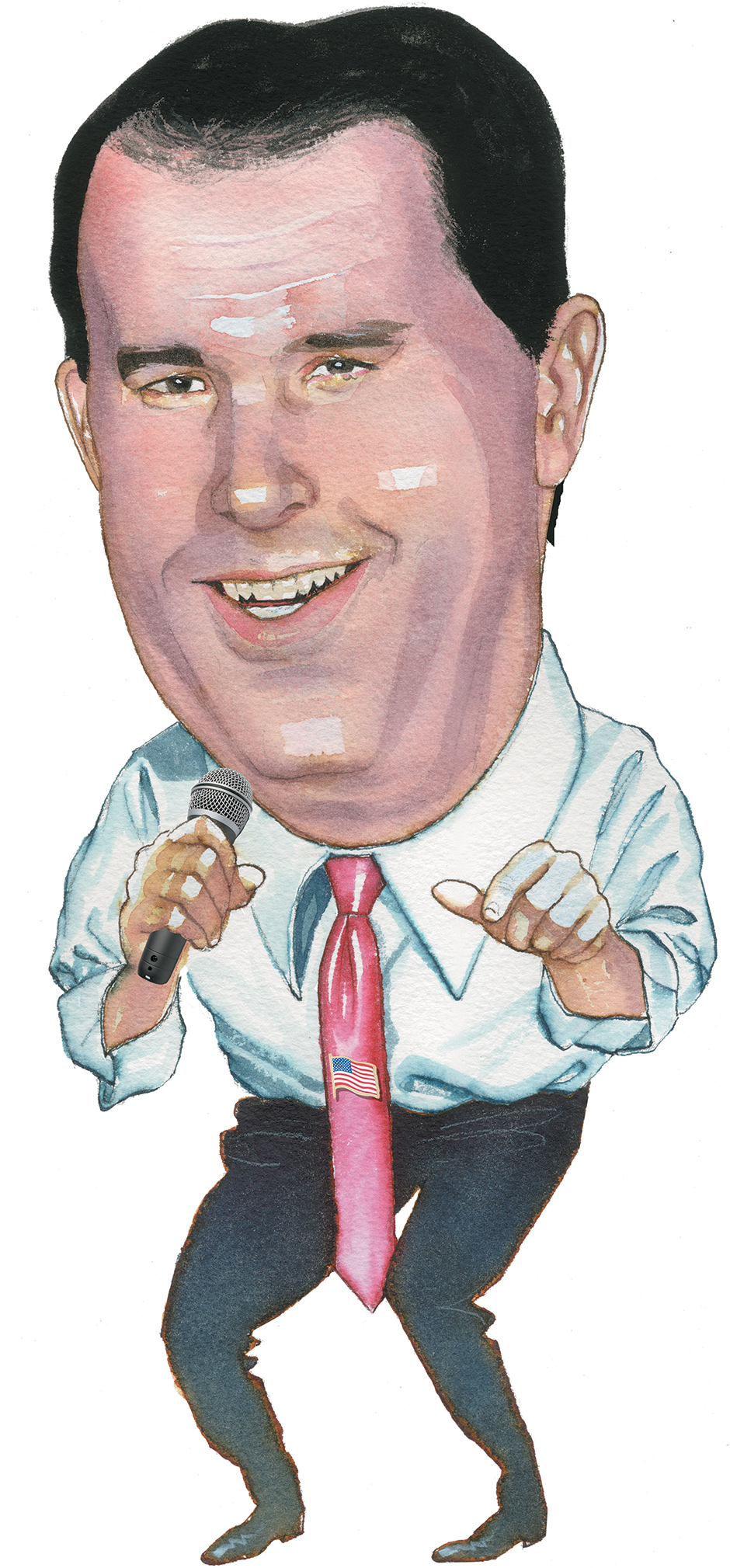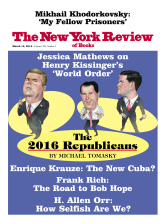In any given presidential campaign, there exists what we might call an “issues palette”—an underlying set of public concerns that seems likely to end up being what the race is fundamentally about. To take three obvious examples: the 1932 election was about the Depression; the 1980 campaign focused on stagflation, the Iranian hostage crisis, and the larger questions of statist failure; the 2008 campaign, from September 15 onward, hinged on the economic meltdown and its dangers.
The important point about these issues palettes is that they always tend to favor one party or the other, for the obvious historical reason that our two parties are associated in the public mind with particular sets of issues, and each is seen by most voters as good at certain things and bad at other things. If terrorism or deficit reduction is the top electoral preoccupation, the tilt will be toward the Republicans. If an election ends up turning on protecting Social Security and Medicare, that should favor the Democrats. (The condition of the economy underlies everything else, and the incumbent party is typically rewarded or punished based on its strength or weakness.)
So here we are, in the protean stages of the 2016 campaign, and already it seems that we can say, with all the requisite qualifiers, that the issues palette should be reasonably favorable to the Democrats. As matters are shaping up so far, the sense of many people I speak to is that the election appears destined to be about the condition of the middle class, the issue of wage stagnation, and the recognition (finally) that the American economy has been working far better for those at the top than for those in the middle or, obviously, on the bottom.
The salient basic numbers are these. Since 1979, compensation for the top 1 percent has grown 138 percent, while median wages have increased just 6.1 percent. Worker productivity has grown 63.5 percent in this time, and if wages had kept pace with productivity, the annual median wage today, instead of being around $35,300, would be $54,400.
All this has been known for a long time, and groups like the liberal Economic Policy Institute have produced dozens of papers documenting the problem. But middle-class wage stagnation, and the inequality that has resulted as compensation at the top has surged, has never been the central economic preoccupation of Washington. It is becoming so now.
This is happening for a number of reasons, some of which have percolated up by design, others by accident. Certainly, President Obama has taken up the theme of middle-class incomes with considerable energy. Various Democratic-minded think tanks in Washington push the notion as well. The Center for American Progress, arguably the most influential of these groups, released in January a major report on “Inclusive Prosperity”1 that recommended a range of policies—increased profit sharing, greater bargaining power for workers, vastly more infrastructure investment—to bring the have-nots closer to the haves. The real significance of this report was that the commission that drafted it was co-chaired by Larry Summers, whose endorsement of these ideas might make them more politically palatable to Hillary Clinton.
So there is some coordination here, but mainly, it’s just the way the cards are tumbling. However prematurely, Washington seems to have agreed, around the arrival of the New Year, that the recovery is on and that we have entered a new economic phase. A new phase brings a new set of questions, and the one being asked most insistently these days is: Yes, all the indicators are positive, except wages, where growth has remained sluggish. What are we going to do about that?
We have entered this phase just as the presidential campaign has begun to take shape, which forces the candidates to present their bona fides on the question. This was demonstrated most conspicuously by Mitt Romney during his three-week flirtation with a third run.
The man who could never shake his comments about the “47 percent” back in 2012 was clearly seeking this time to position himself as the tribune of the 99 percent if he ran. “We need to restore opportunity, particularly for the middle class. And that will soon include you,” Romney said in a speech to students at Mississippi State University on January 28. “You deserve a job that can repay all you’ve spent and borrowed to go to college.”
Then, in early February, in his first big policy speech, Jeb Bush emphasized the “opportunity gap,” telling the Detroit Economic Club that “only a small portion of the country [is] riding the up escalator.” Median incomes are down, he said, and “households are, on average, poorer.” In Romney’s absence, Bush has become the instant front-runner among the candidates representing the establishment wing of the party, and the big money will likely coalesce around him and his message, at least to the extent to which conservative plutocrats can bear to do so.
Advertisement
On the evidence of his February 18 speech to the Chicago Council on Global Affairs, Bush’s foreign policy will not differ dramatically from his brother’s. Rhetorically, Bush tries to sound more like his realist, cautious father. But the substance of his policy positions puts him closer to George W. (the phrase “take them out” when applied to the Islamic State can mean only a ground war, although he’s not likely to admit to that). And he is surrounding himself with some of his brother’s key advisers—most surprisingly Paul Wolfowitz, the intellectual architect of the disastrous Iraq intervention.
The odd thing is that Bush polls no better against Clinton than several of the other candidates; so he is the front-runner in the financial sense, but no other. His politics are basically conservative, which is reflected by his record as governor of Florida on issues from education to privatization to his lamentable handling of the Terri Schiavo case, when he defied all medical expertise and advice to pander to a right wing that believes in preserving “life” in all situations.
But, surely aware that staking out nothing but those kinds of positions makes a Republican unelectable, Bush began a couple of years ago to present himself as more moderate, on immigration and supporting the “Common Core” learning standards and, now, on economics, which will obviously be his major talking point. Naturally, these positions have awakened contempt for and distrust of Bush within the more extreme base voters, among whom he polls poorly. A big fight clearly looms.
The Democrats will face their own drama with regard to these economic questions. What will the presumptive nominee Clinton propose along these lines? How bold will she be? Those desperate for Senator Elizabeth Warren to run are petitioning her not only because they adore Warren, but because they fundamentally don’t trust Clinton to embrace aggressive middle-class populist policies. This is a real concern, and Clinton is apparently going to make us all wait for a while, perhaps until the summer, before she starts issuing ideas about policy.
But here’s the difference between Clinton and the Republicans. She, like virtually all Democrats, accepts the basic fact that wages for median workers have been more or less stagnant since 1979. She probably accepts the idea that this stagnation, alongside rising inequality, is the greatest economic challenge we face. She probably accepts the standard set of reasons that economists offer about why this has happened—globalization, technological change, immigration patterns, a decrease in workers’ bargaining power, the rise in high-end compensation, and various federal tax and wage policies. And finally, she probably accepts that the solutions to the problem are chiefly economic solutions—changing tax policy, giving workers greater “voice,” taking steps to ameliorate the negative effects of globalization, and so on.
The extent to which Republicans accept any of this is far from clear. In six recent books by announced or likely GOP presidential contenders—except Paul Ryan, who surely wrote his book thinking about a run but has apparently decided against it—one hardly encounters the word “wages.” In only one of them, Marco Rubio’s American Dreams, is there anything resembling what you’d call a discussion of wage stagnation. This lasts for all of four paragraphs, and begins as follows:
After decades of growing incomes for the middle class, the years between 2000 and 2011 were what the Pew Research Center calls a “lost decade.” In those years, middle-class Americans made less money, had more debt and had less wealth—in fact, for the first time since World War II, the middle class actually shrank in size.
He’s not quite correct to suggest that incomes grew steadily for decades. They have fluctuated a great deal in the last forty years. They took a hit under George H.W. Bush, for example, such that, after adjusting for inflation, the median household income in 1996 ($52,471) was essentially the same as in 1989 ($52,432).2 Still, Rubio deserves credit for admitting that the picture was bleak under George W. Bush, something Republicans don’t always acknowledge. To the extent that any of them discuss wage stagnation, they discuss it only as yet another blight visited on America by Barack Obama, completely ignoring the longer historical trends.
Even when Republicans acknowledge the wage problem, they don’t see it as resulting from chiefly economic factors. To them, the main culprits are moral decay and culture, notably the decline of the two-parent family—a father and a mother, it nearly goes without saying. Rick Santorum, who made his name as a Pennsylvania senator inveighing against liberal turpitude and comparing homosexuality to bestiality, has passed the time since 2012 refashioning himself as the right’s answer to Elizabeth Warren, the man who really cares about the working classes. Here is Santorum on how the American Dream is to be restored:
Advertisement
Conservatives are often criticized for their romanticized view of the good old days prior to the culture shock that was the 1960s. Having said that, let’s make no mistake about it—the greatest threat to the average American’s achieving his dream today is a dysfunctional culture. To heal our nation, we must promote the ideals upon which American culture has thrived for over two centuries—ideals based on timeless truths.
When people don’t see structural economic factors as the problem, they’re hardly likely to hit upon plausible economic solutions.
It may not be saying much, but Rubio has written what is far and away the most serious of the recent books. Close observers of the Washington scrum won’t be too surprised by this. The Florida senator came to Washington in 2011 as a Tea Party–backed avenger but has, as they like to say in the capital, “matured.” During the past couple of years, he has given speeches on issues like poverty and higher education, topics that conservatives often leave to liberals. He proposed a reform to the Earned Income Tax Credit, the program that offsets the tax burden of lower-income families, that the Obama administration has embraced, extending the credit to households without children.
Unlike the other campaign books, American Dreams is at least largely about policy. There are chapters on the struggles of the middle class, regulation in the age of the “sharing economy” (Uber, Airbnb, etc.), higher education, retirement, economic security, and, inevitably, values. Chapters open with homiletic descriptions of the particular crisis in question, told through the stories of a few real-life Americans Rubio has encountered in his journeys, and then move on to prescriptions.
His prescriptions aren’t innovative. On poverty, as he said in his speech about a year ago, he wants the federal government to eliminate many of its programs and turn the money over to the states with fewer strings attached. Ronald Reagan proposed this a generation ago. Rubio’s chapter on retirement largely repeats the proposals set forth by Paul Ryan in his budgets, proposals that would (especially with regard to Medicare) result in much higher out-of-pocket expenses for future seniors, according to the Congressional Budget Office.
Where his solutions aren’t standard conservative policies, they are in fact already in place. With regard to higher education, for example, he wants a transparent, return-on-investment kind of ranking of colleges and universities, so that applicants and parents can see what kinds of salaries graduates make. And he favors something called “income-based repayment” that would reduce the monthly cost of most graduates’ loans. These are plausible ideas. The Obama administration has instituted them both (though not yet on a large scale).
Rubio may or may not seek the presidency. The almost certain candidacy of his fellow Floridian Jeb Bush complicates things for him. (Sometime this spring, Bush will release his own e-book, which will presumably echo the broad themes of his recent Detroit speech.) In addition, Rubio is up for reelection to the Senate in 2016, and he has already said that he will follow Florida law, which forbids seeking two federal offices simultaneously.3 On the evidence presented here, we should hope he does run for president, since he at least seems to want to debate real issues rather than largely imaginary liberal perfidies.
Santorum’s Blue Collar Conservatives is not an embarrassing book, but ultimately it’s a dissatisfying one. Fire-breathing right-winger though he is, Santorum had a long history in the Senate of being one of the few Republicans who bothered to look closely at matters like welfare policy. One doesn’t doubt his sincerity when he writes sentences like “We Republicans have neglected to focus our policies and our rhetoric on the plight of lower-income Americans.” Like Bush, Santorum is working off the same script, to some extent, as the so-called “Reformicons,” the conservative pundits and intellectuals who have been trying to push the GOP to take middle-class economics seriously (a quote from Reformicon Ross Douthat of The New York Times appears on the back of Santorum’s book).
But Santorum puts forth no policy solutions of real interest. His chapter called “Giving the American Worker a Fighting Chance” ends with really just two policy recommendations, and they’re the same old ones: cut the corporate tax rate and reduce regulations.
The most annoying of the “serious” books, though, is easily Paul Ryan’s. The Wisconsin congressman and 2012 vice-presidential nominee is often supposed to be more analytical about public policy than most of his colleagues. One might have thought, then, that he was equipped to present a serviceably respectable conservative response to the problems of stagnant wages and increasing inequality. But The Way Forward has surprisingly little to say about these matters, although in fairness there is a long chapter on poverty.
What instead bursts through the verbiage of his book is Ryan’s irritating combination of serene rectitude and almost total lack of self-awareness. A favorite Ryan dyad of recent vintage was “makers and takers,” his phrase to describe those who contribute to society and those who take advantage of federal largesse. He seemed happy about this slogan. But then one day in 2012, a man challenged him: Who are these takers you speak of? “Is it the person who lost their job and is on unemployment benefits? Is it the veteran who served in Iraq and gets their medical care through the VA?” Apparently, none of this had ever occurred to Ryan, who writes:
Although he doesn’t know it, that guy taught me a valuable lesson that day. It took me a while to completely come around, but I soon realized that the phrase I’d been using implied a certain judgment about the group that receives government benefits—one that is in deep conflict with the American Idea.
I can think of no context in which “taker” does not carry a pejorative connotation. That Ryan had no idea he was insulting half of America (probably more like three quarters) speaks volumes about him and serves as an apt metaphor for conservatism’s intellectual and emotional distance from the Americans it brands as such.
The great conservative preoccupation, as noted, is culture. If you are a candidate and you want the conservative base to lend you its ear, you must thunder that America’s most pressing problem has to do with values.
This brings us to Ben Carson, one of the more interesting characters to publish a political polemic. Carson is African-American, a neurosurgeon who grew up poor in Detroit, and a recipient of the Presidential Medal of Freedom (given to him by George W. Bush). He is extremely conservative. His media moment, the event that put him on the radar screens of conservatives everywhere, came when he gave the keynote address at the 2013 National Prayer Breakfast. With Obama sitting within feet of him, Carson castigated America’s weak leadership and bemoaned its “moral decay” and “fiscal irresponsibility” (he opens One Nation with a transcript of the speech and description of that morning). In another speech, he called Obamacare “the worst thing that has happened in this nation since slavery.”
His book is organized into three parts. Part One is the most revealing: “Causes of Disunity and Decline.” Rising inequality? Globalization? No, problem number one is political correctness. Second comes elitism. Carson is said to be hiring a staff in Iowa. Small wonder that he is polling well among Republican primary voters—generally speaking, he’s at the bottom of the first tier of candidates, behind Bush and Chris Christie but ahead of figures like Rubio, Santorum, and governors Rick Perry and Bobby Jindal.
The rhetorical style of One Nation is mild-mannered; Carson urges readers at several points to try to take a deep breath and see things through the other fellow’s eyes. The tone belies the radical nature of his views, which he tries to conceal in these pages but which erupt every so often. He appears to believe, for example, that people who pay no net federal tax—that’s nearly half the country, the famous 47 percent—should not have the right of the franchise: “Serious problems arise when a person who pays nothing has the right to vote and determine what other people are paying.”
Carson seems to have loaned his rhetorical axe to Mike Huckabee, the former Arkansas governor whose deplorable book God, Guns, Grits, and Gravy is exactly what it sounds like. It’s an extended pander to the resentful, conservative, evangelical, and probably southern American who doesn’t want liberals who think they’re better than he is telling him what to do. One would call it a dog whistle, except that we Yankee dogs can hear the whistle loud and clear, which is presumably as the author intends.
Huckabee, who has spent the past few years hosting a weekly show on Fox before a live studio audience (he recently gave it up to prepare his candidacy), knows his constituency. The book is full of applause lines (“The IRS is a criminal enterprise”). Chapters carry titles like “Salt, Sugar, Soda, Smokes, and So Much More.” There are a few feints in the direction of talking about policy, but these quickly dissolve into rants. The chapter that purports to be about the economy is really just a long attack on the state of California, where Governor Jerry Brown is alleged to have throttled innovation and initiative with his regime of high taxes and heavy regulation. You’d hardly know from reading the book that California is America’s leading laboratory of innovation (Silicon Valley), and that despite serious post-recession economic woes, it has now bounced back.4
As a matter of political strategy, Huckabee’s book is about the Iowa caucuses, where a disproportionate percentage of the electorate consists of evangelicals. If he doesn’t win or at least exceed expectations there, he’ll be out. He could hardly have made his hunger for their support any clearer.
And this brings us to Scott Walker. The Wisconsin governor is the man of the moment (at least as I write these words; such moments can be fleeting). He had a big success in late January at the “Iowa Freedom Summit,” a confab hosted by Congressman Steve King, one of Congress’s most extreme radicals. He began surging in polls afterward. The conservative websites have been impressed.
What’s Walker got? He’s been elected and reelected governor in a state that hasn’t voted Republican at the presidential level since 1984. He took on the great liberal dragon of the public employee unions, winning passage of legislation that severely limited the collective bargaining rights of most such unions, hiked members’ pension and health contributions, and made dues payments optional. (Membership in the main public employee local of Madison has dwindled from around 32,000 before the act’s passage to roughly 13,000 today.) When the unions led a recall election against him, he won that, too, making him the first governor in US history to beat back such a challenge.
He’s a preacher’s son and a man of apparently simple and straightforward tastes and enthusiasms. His oddly set eyes seem to conceal more than they reveal, but even this feature is arguably an asset, at least to his admirers: he’s not too handsome, just a nice, regular-looking man. The religious right approves of him, and he enjoys the firm support of the Koch brothers and others with big money.
Walker has written a different kind of book from the others. It’s an advertisement for himself, a kind of auto-bildungsroman about his victory over the forces of darkness in passing Act 10, as the anti-union bill was known. The chapters carry dramatic titles—“Bring It On,” “This Is War!,” “You Can’t Recall Courage.” He compares himself to Ronald Reagan. And the last chapter—that is, before the conclusion, postscript, and epilogue—is called “The Lessons of Wisconsin Can Be Used in the Battle for America,” to drive the whole point home, lest anyone miss it.
Walker pursues one clever strategy, which was a theme of his Iowa speech as well. Aware that the noun “conservative” is often preceded by the adjective “heartless,” he plays offense on this question:
Most Americans believe that conservatives care about balancing budgets, while liberals care about putting more money into classrooms. But in Wisconsin, our reforms put more money into classrooms. It was the unions and the Democrats who were ready to see us cut a billion dollars from classrooms, and lay off thousands of teachers, just so long as they could continue to fill their coffers with involuntary union dues. We stopped them, and protected students and teachers from disastrous cuts.
He boasts of his state’s “Obama-Walker voters”—that is, the people who voted for Obama for president and Walker for governor. He cites their existence as evidence of his crossover appeal.
He may have it. But it’s at least as likely that these are voters who don’t mind having a Republican governor every so often but wouldn’t seriously consider voting for a conservative Republican for president. Seven states that haven’t voted for the Republican presidential candidate since at least 1988 currently have GOP governors: Illinois, New Jersey, Massachusetts, Maryland, Michigan, and Maine, as well as Wisconsin. In the five polls of Wisconsin taken in 2014 and recorded by the website RealClearPolitics, in head-to-head matchups, Hillary Clinton beat Walker every time, by an average of nine points.
Those Obama-Walker voters may have no love for public sector unions, but they care about social issues like abortion and same-sex marriage, on which most tilt toward the Democratic position; and they certainly will care, as this campaign grinds on, about what the candidates have to say about middle-class wages.
The Republican Party has spent many years ignoring wage stagnation and dismissing talk of inequality as, in Paul Ryan’s recent phrase, “envy economics.” An interesting dividing line will emerge in this field between those who emphasize these concerns and those who don’t; but even those who are willing to discuss the stagnant situation of the middle class will need to present fresher and less ideologically constrained prescriptions than are on display here.
This Issue
March 19, 2015
Can They Crush Obamacare?
The Road from Westphalia
-
1
The report can be found at www.americanprogress.org. ↩
-
2
The median household income—different from the annual median wage, a figure I use above—actually dropped in the early 1990s. These numbers come from the Federal Reserve Bank of St. Louis, at research.stlouisfed.org/fred2/series/MEHOINUSA672N. ↩
-
3
Joe Lieberman did something similar in 2000, running for both vice-president and senator. Kentucky Republican Senator Rand Paul is in the same boat as Rubio. He wants to run for both offices, but Kentucky law prevents it, and right now, the lower house in the state is controlled by the Democratic Party, which is unlikely to oblige him by changing the law. ↩
-
4
See, for example, Vauhini Vara, “How California Bested Texas,” The New Yorker, January 8, 2015. ↩


